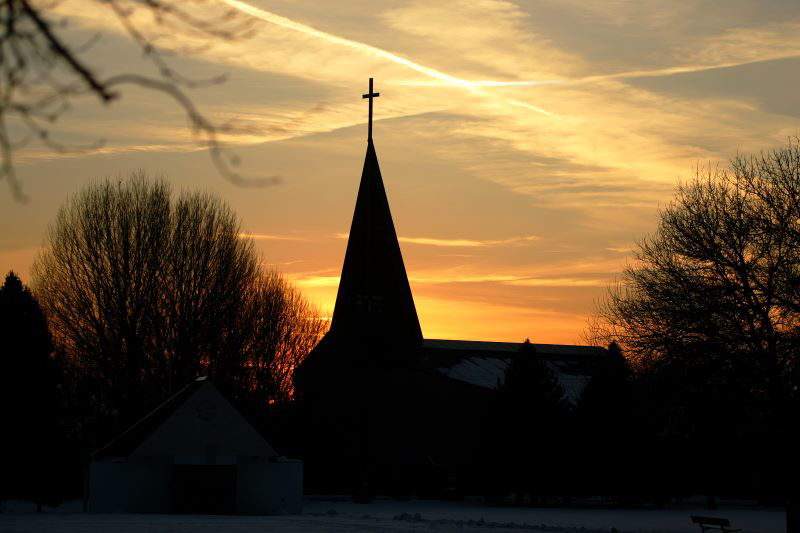Won't You Be My Neighbor?
Sign up for a six month free
trial of The Stand Magazine!
Throughout my adult life, I have lived in six communities across three states, large cities, small towns, and everything in between. Amazingly, many of the neighbors we had in those six places are still dear friends who are a constant part of our lives. In fact, several of those neighbors positively impacted our marriage, our children, and even our walk with Christ.
Those neighbors became more than friends, much like family. They have shared good times and dark times with us throughout the years. So, I was not surprised when two of those neighbors (who live in two other states) met and drove together to attend our son’s funeral. Truth be told, those two women played a big role in his early childhood, instilling habits in him that lasted throughout his life – including his choice in favorite foods.
But in all our moves, we also had neighbors that we knew only by sight rather than by name. No matter how we tried to be neighborly to those folks, they seemed wary to let down their proverbial fences and allow us to become better acquainted. Privacy and distance were what they obviously desired most from us as their neighbors.
According to a March 2025 survey conducted by Pew Research, those loner neighbors of ours might not be totally alone in their desire not to be neighborly. In fact, 12% of people polled by Pew did not know any of their neighbors whatsoever, with another 62% knowing some of their neighbors personally, and 26% claiming to know most of their neighbors.
Yes, we are definitely in the majority statistic of that polling, but I would have loved to be in the quarter of those who knew most everyone in their neighborhood. A sense of community has always been important to me as far back as I can recall. There is just something about the security of knowing that no matter what happens, I can call and count on my neighbors to come to my aid – for minor things or major problems.
I am pretty sure I garnered that tendency toward community and neighborliness from my childhood church. I saw the spirit of community and caring for neighbors modeled continually by the adults in my church. And that modeling carried over to the teachers in our schools and the citizens of my small hometown. When one of us was hurt, we all felt that pain; and when one of us had a need, we all came together to help fill that need. So, the spirit of unity came naturally to me as an adult.
Sadly, that spirit of unity and neighborliness is not necessarily a given attribute taught or modeled in all our local churches today. A recent article (Your Church Is Facing a Community Disconnect: Now What?) from Lifeway Research, written by Tyler Harden, a church growth consultant and co-founder of Firm Foundations Marketing, confirms this sad fact.
The article identified five ways that churches disconnect from their local communities, as well as five ways to prevent that disconnection and help the church thrive. Interestingly enough, the number one suggestion to increase connectivity in churches was “Know your neighborhoods.”
Harden’s marketing firm even offers a community research guide to help churches discover who resides in their community and what those neighbors need from a local church.
Granted, in decades past, life was simpler and slower, making it easier for churches to know their neighbors and feel their needs. But the message of loving our neighbors is found throughout the Bible, in both the Old and New Testaments. Perhaps that biblical command is best summed up in 1 Corinthians 10:24: “Let no one seek his own good, but that of his neighbor.” Most importantly, it has not and will not change – regardless of church size, community size, or the ever-changing, fast-paced, modern world in which we live.
But I get it; I do. And I readily confess that I fall short in this respect, and I also admit that I find it increasingly difficult to be a good neighbor. I have great intentions, but after a few attempts at offering neighborly kindness or even just friendly banter, I have gladly dropped the ball. It is as if I released a big sigh of relief when new neighbors did not openly accept those first attempts. I was off the hook!
But then, we moved one more time – to a small farmhouse in the country, nearer to our son’s family. It was our dream home, a place to retire with peace and tranquility, surrounded by beautiful nature and some of the kindest people on earth in a nearby small community we have grown to love.
Instantly, I was carried back to my childhood church, to a time when neighbors were really neighbors. It was both refreshing and convicting when our neighbor across the road brought us a delicious home-cooked meal on Sunday, the second night of our move.
We met this precious woman and her family a few years ago, while watching our son coach theirs in baseball. So, her gift was not a total surprise … not until we realized that she would bring us Sunday supper every week thereafter – no matter what.
When I broke down in tears and questioned her about this act of neighborliness, I assured her that she did not have to do this. But she quickly and firmly reassured me that this was her ministry. She explained that she loves cooking and caring for those she loves – and this act is her way of honoring God and His love for her. And she truly counts her neighbors among those she loves.
I cannot tell you what this weekly meal means to us. We look forward to it for days, wondering and discussing what amazing foods she has planned for our Sunday treat. And each meal is a delicious surprise that makes us feel more loved and accepted than we have felt in years, probably not since the last time, years back, when I ate a home-cooked meal at my momma’s table, if the truth be told.
But every bite of that lovingly prepared Sunday meal is also a convicting reminder of God’s command to love our neighbors. It is a call to go beyond the modern-day fences we put up to deflect our deep, human need to connect, to love, and to be loved in return.
So, I write all this first, to confess my own shortcomings, but also to encourage myself and others to look for one simple ministry that can fill the unvoiced needs of our neighbors. This ministry of the good neighbor might involve cooking a meal, mowing a lawn, making a cup of coffee, washing a car, playing ball with a child, stopping to talk, or simply asking how someone is faring.
Whatever it takes, I challenge each of us to be genuinely good neighbors. In doing so, we not only spread the gospel message through words and deeds, but we also slowly and surely change our neighborhoods for the better when we love our neighbors.
In fact, when asked about the greatest commandment, Jesus spoke of two:
Jesus answered, “The foremost is, ‘Hear, O Israel! The Lord our God is one Lord; and you shall love the Lord your God with all your heart, and with all your soul, and with all your mind, and with all your strength.’ The second is this, ‘You shall love your neighbor as yourself.’ There is no other commandment greater than these” (Luke 12: 29-31).
The command is clear. The rest is up to us, neighbor.

Sign up for a free six-month trial of
The Stand Magazine!
Sign up for free to receive notable blogs delivered to your email weekly.



















